The Prestige signals what it is about from its opening scene, as the ingenieur John Cutter (Michael Caine) performs a trick to amuse young Jess Borden (Samantha Mahurin). He places a bird in a cage, hides the cage behind a cloth, and slams the cloth down. The bird vanishes. However, that’s not an impressive trick. As Cutter narrates, “making something disappear isn’t enough; you have to bring it back.” So, he brings it back, and Jess claps.
The Prestige later explains how that trick is performed. When Cutter slams the cloth down, the cage snaps into the table. The bird is crushed in that movement, with the magician having to clean out the compacted cage between acts. Naturally, the bird that reappears is a different bird, one picked from a seemingly endless supply of identical birds. “You’re the lucky one today,” remarks Alfred Borden (Christian Bale) to one such survivor later in the movie.
This idea of scale and reproduction recurs. The movie’s opening image is a sea of identical top hats in a forest clearing. “Are you watching closely?” Borden asks the audience as that opening shot cuts to black. The implication is clear: This is the trick. This is what the movie is about. In that opening image, The Prestige communicates to its audience its central recurring preoccupation. This is a horror story about industrialization, mass production, and capitalism.
The Prestige is about two dueling magicians, Alfred Borden and Robert Angier (Hugh Jackman). Borden is involved in the tragic death of Angier’s wife, Julia McCullough (Piper Perabo). However, their rivalry heats up when Borden debuts an incredible trick known as “The Transported Man.” That trick becomes the heart of the rivalry between the two men, with Angier dedicating himself to replicating Borden’s signature illusion.
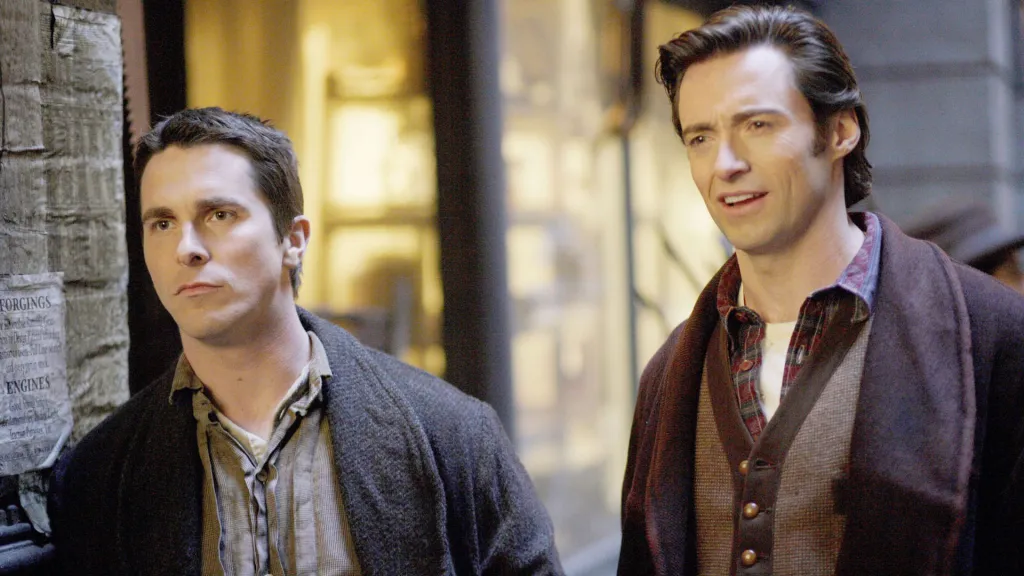
The Prestige is preoccupied with wealth and class. Borden is a working-class magician who clawed his way up to respectability, inventing the persona of “the Professor.” In contrast, Angier is the son of a wealthy family, slumming it in show business. The framing device is a trial in the aftermath of a trick gone wrong, when Angier drowns in a water tank beneath the stage during a performance of the trick he stole from Borden. Borden is accused of murder.
Even in the midst of a murder trial, the magicians are aware of their economic realities. Cutter refuses to disclose the particulars of Angier’s illusion in open court, because that would make it impossible for him to sell it on afterwards. Even on trial and awaiting execution, Borden is sought out by Owens (Roger Rees), a solicitor who represents the wealthy Lord Caldlow. Caldlow is “an amateur magician” who wants to buy Borden’s tricks. Borden agrees, to provide money for his daughter, Jess.
The Prestige arrived at an interesting time in Nolan’s filmography. He had jumped from his debut film Following to a low-budget indie, Memento. He had then been recruited by Warner Bros. to make a mid-budget, star-driven remake of a Swedish film, Insomnia. After that, he was tasked with rebooting one of the studio’s hottest intellectual properties with Batman Begins. In only a few years, Nolan had gone from student director to studio filmmaker.
There’s a palpable anxiety that runs through Nolan’s three movies after Batman Begins: The Prestige, The Dark Knight, and Inception. All three movies are about men who become trapped inside larger mythologies that they have created around themselves. In The Dark Knight, Bruce Wayne (Christian Bale) grapples with the consequences of “escalation” that stem from his success as Batman. In Inception, Dom Cobb (Leonardo DiCaprio) finds his plans derailed by his own subconscious.
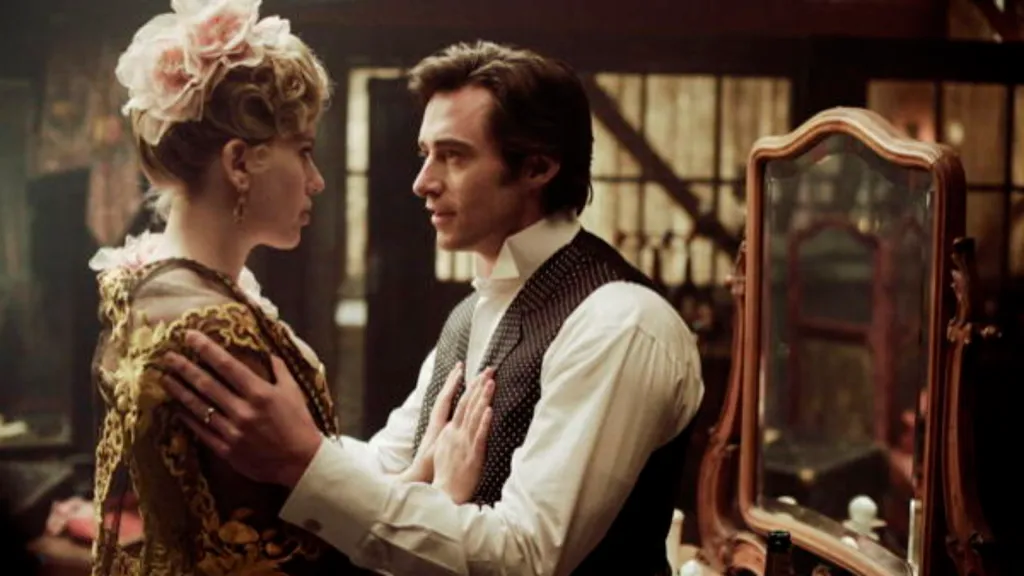
In The Prestige, the conflict between Borden and Angier is largely framed as the battle between Borden as an artist and Angier as a showman. Borden is the more inventive of the pair, designing his own tricks in his own workshop. In contrast, Angier largely depends on Cutter to design his illusions. When Borden debuts his trick, Angier is stunned, but the audience is somewhat nonplussed. Cutter explains Borden is “a dreadful showman; he doesn’t know how to dress it up, how to sell it.” Angier knows how to sell it.
The Prestige suggests Angier never truly understands Borden’s trick because he cannot understand Borden’s desperation. Early on, Cutter assigns the pair to explain how Chung Ling Soo (Chao Li Chi), a frail old Chinese man, performs an illusion where he causes a fishbowl to materialize on a table. Borden figures out that the act isn’t what happens on stage; the act is Chung Ling Soo’s life off of stage. He pretends to be frail off-stage so nobody suspects he’s dexterous enough to complete the illusion.
Angier cannot wrap his head around why somebody would dedicate themselves so completely to an illusion that it would consume their entire life. “This is why no one can detect his method,” Borden tells Angier. “Total devotion to his art. A lot of self-sacrifice, you know. It’s the only way to escape… all this, you know?” Borden raps on the stone walls of the street for emphasis. “All this” is a life of poverty in Victorian London. Borden understands what it is to so desperately need that escape.
During a heated debate, Borden contends that “a real magician tries to invent something new that other magicians will scratch their heads over, you know?” Cutter chimes in, “Then you sell it to him for a small fortune? I suppose you have such a trick, Mister Borden?” When Borden admits that he does, Cutter presses, “Would you care to sell it to me?” Borden replies, “No. No one else can do my trick.” Angier cuts in, “Any trick can be duplicated. Right, Mister Cutter?” Borden interrupts, “Wrong.”
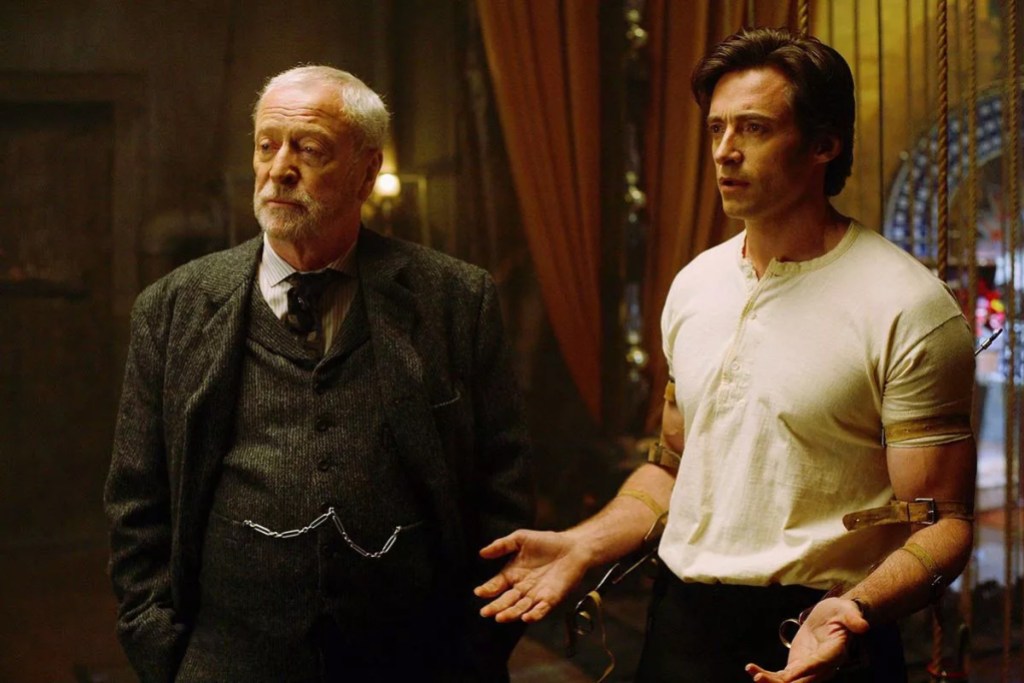
Borden does have a unique trick. He isn’t one person. He is a set of twins, “Alfred” and “Freddy.” These twins have lived a shared life, entirely in secret. Nobody knows that there are two of them, even Borden’s wife, Sarah (Rebecca Hall). When Angier shoots off two fingers on the hand of one twin, the other hacks off those same two fingers to preserve the illusion. This is the key to Borden’s “Transported Man” trick, in which the magician seems to spontaneously teleport across the stage.
Borden makes this sacrifice because it is the only way that he can afford to provide for his family. Each of the twins has to sacrifice their personhood to turn themselves into a marketable economic commodity. This is the only worth they have in a capitalist society. As Borden warns Sarah’s nephew (Anthony DeMarco), showing him a trick, “Never show anyone. They’ll beg you and flatter you for the secret, but as soon as you give it up, you’ll be nothing to them. You understand? Nothing.”
This would be grotesque and unsettling enough, but The Prestige goes even further. Angier is obsessed with finding a way to replicate Borden’s trick without knowing the secret, as well as with finding a way to scale it up. Angier wants to take something unique and distinct about Borden as a human being, an accident of birth, and turn it into something that can be mass-produced as spectacle. Angier lacks Borden’s creativity and commitment to realize this ambition, but he does have one sizable advantage. He is very rich.
The Prestige unfolds during the late Victorian era, at the time of the Second Industrial Revolution, also known as the Technological Evolution. It was a time of radical technological advancement. “The economic changes that have occurred during the last quarter of a century – or during the present generation of living men – have unquestionably been more important and varied than during any former corresponding period of the world’s history,” wrote David A. Wells in 1889. The world was changing, technology was advancing — and capitalism with it.
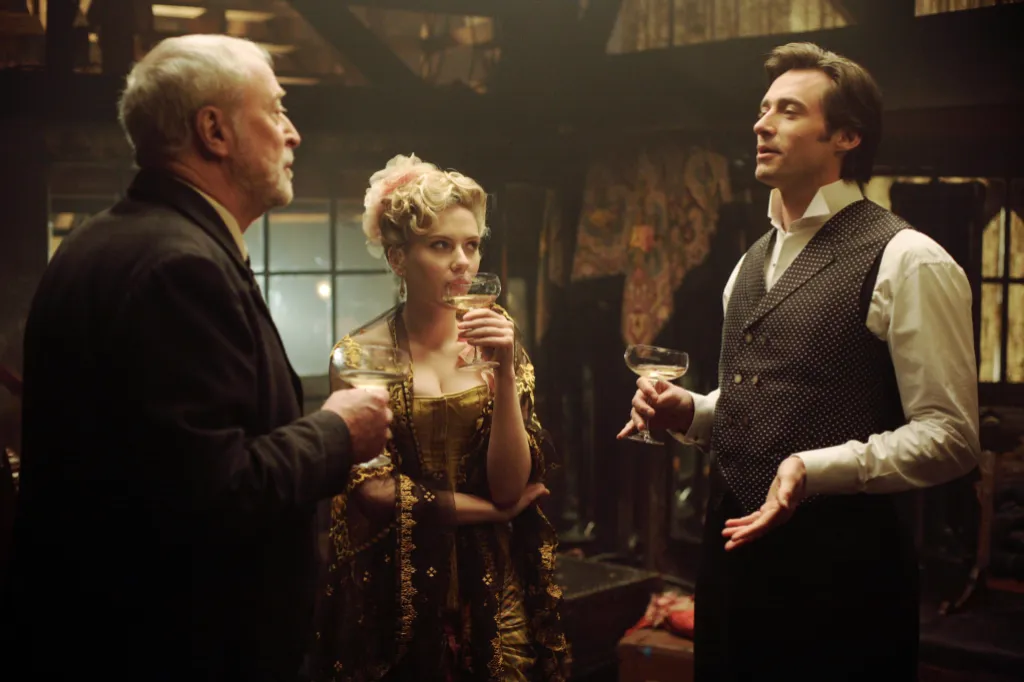
This was an era that saw “a visible shift to ‘modern’ mass production,” and with it a stripping out of humanity in favor of assembly lines. In some ways, The Prestige feels like a companion piece to Oppenheimer and its snapshot of atomic era revolution. The film parallels the conflict between Borden and Angier with the battle between Thomas Edison and Nikola Tesla (David Bowie) over electricity, a battle to define the future of modernity.
Angier turns to Tesla to build him a technological solution to his problem, a machine that will allow him to replicate Borden’s unique skill. Tesla does this, building a machine that can create a copy of whatever is placed within it. A machine of mass production. Tesla himself is horrified by his invention. “Mister Angier, have you considered the cost of such a machine?” he asks. Angier replies, “Price is not an object.” Tesla presses, “Perhaps not, but have you considered the cost?” Tesla is talking about the spiritual cost of such an inhuman device.
For Angier, there is no cost to such a machine beyond its monetary value. Even Tesla’s scruples are overridden by his need for funding. Angier violates all laws of nature and decency, buying a machine that creates a copy of him each and every night, drowning the original in a water tank below the stage. That body in the murder case was a clone. Angier survives as Lord Caldlow. The film’s closing shot is a burning warehouse full of these water tanks, each containing a drowned copy of Angier. This is the price of modernity.
The Prestige juxtaposes this striking closing shot with a number of other images: the hats in the clearing, the birds in the cages, even the rows of light bulbs in the snow outside Tesla’s Colorado laboratory. This is a nightmare of the capitalism that comes with modernity, a world in which everything is mass-produced and everything is defined by its economic value — where human life is as cheap as a bird in a cage and can be commodified so long as that suffering can be disguised. Capitalism’s trick is concealing that brutality, hiding it from consumers.
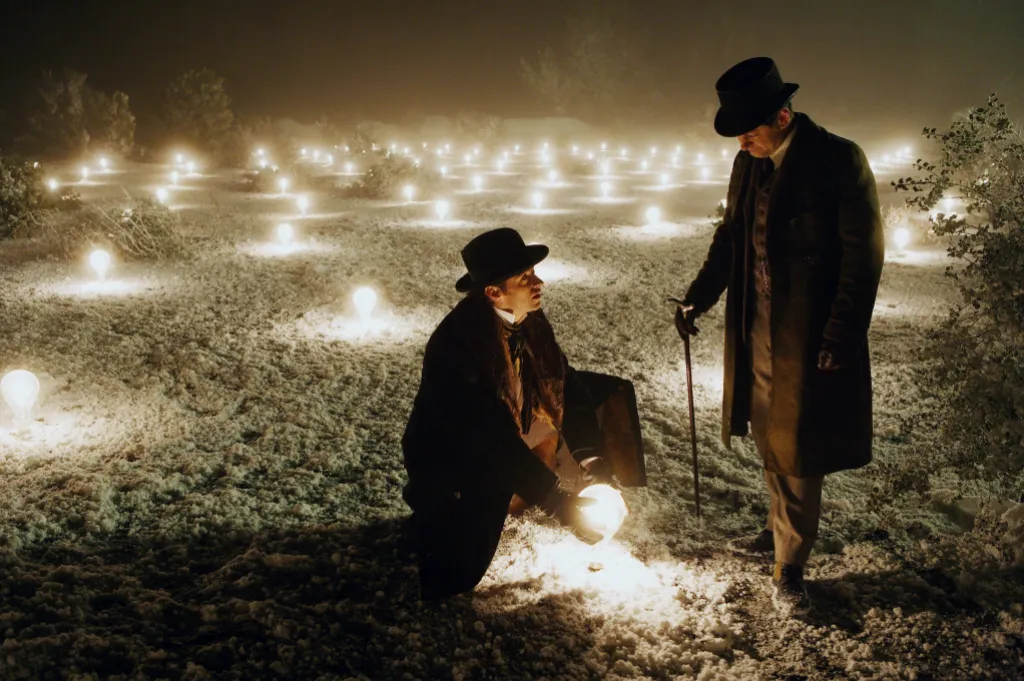
Nolan’s movies have a recurring fixation with the horrors of this sort of capitalism. Inception imagines a future where even people’s dreams are subject to corporate raiders. The Dark Knight Rises is about how maybe Bruce Wayne (Bale) is too rich and too privileged to be Batman. Tenet explores how the super-wealthy live in a world of their own, untouched by the laws of man or physics. The Prestige deals with similar themes.
Hollywood is in the midst of two massive strikes, largely driven by artists’ desire to control their own images and ideas, the belief that creatives should be more than fodder for capitalist exploitation through technology like artificial intelligence or digital replicas. Incidentally, Nolan has walked the line with the writers and voiced support for the actors. The Prestige feels strangely aligned with this. One can only imagine that Hollywood executives would love a device that could produce infinite copies of Hugh Jackman at no financial cost.
There is a compelling contemporary resonance to The Prestige. That’s the movie’s greatest magic trick.

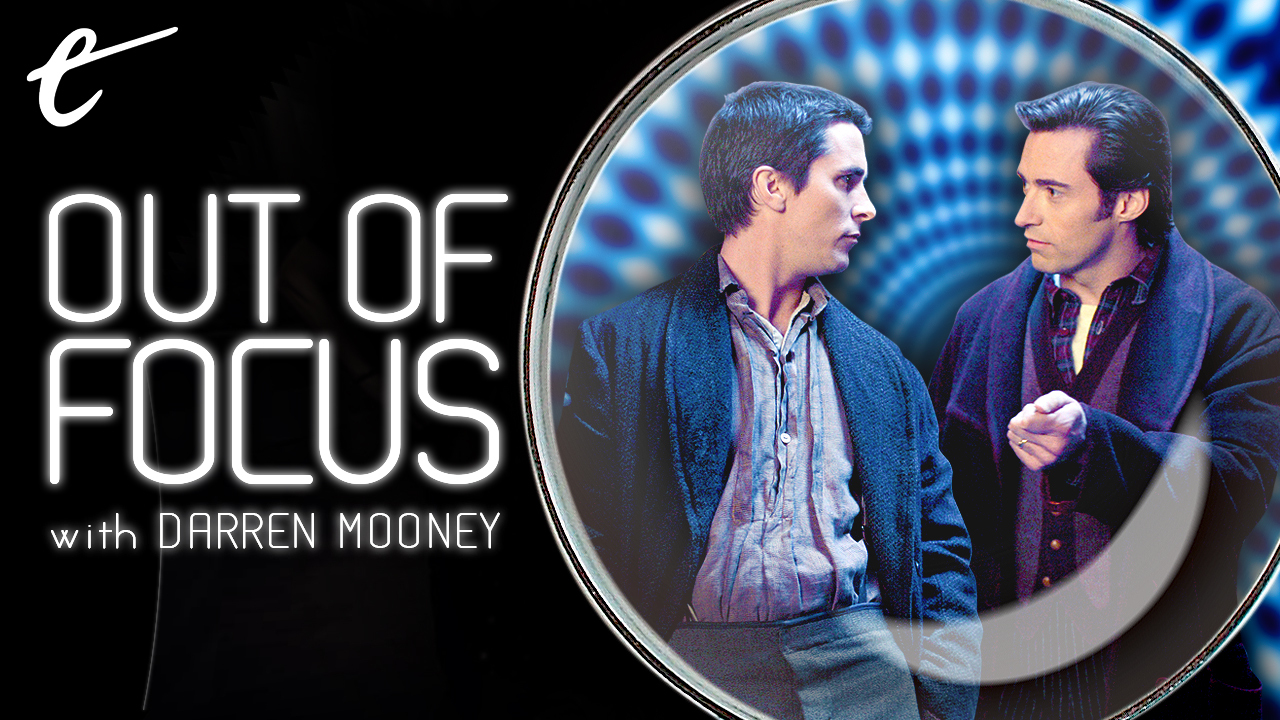




Published: Jul 19, 2023 11:00 am